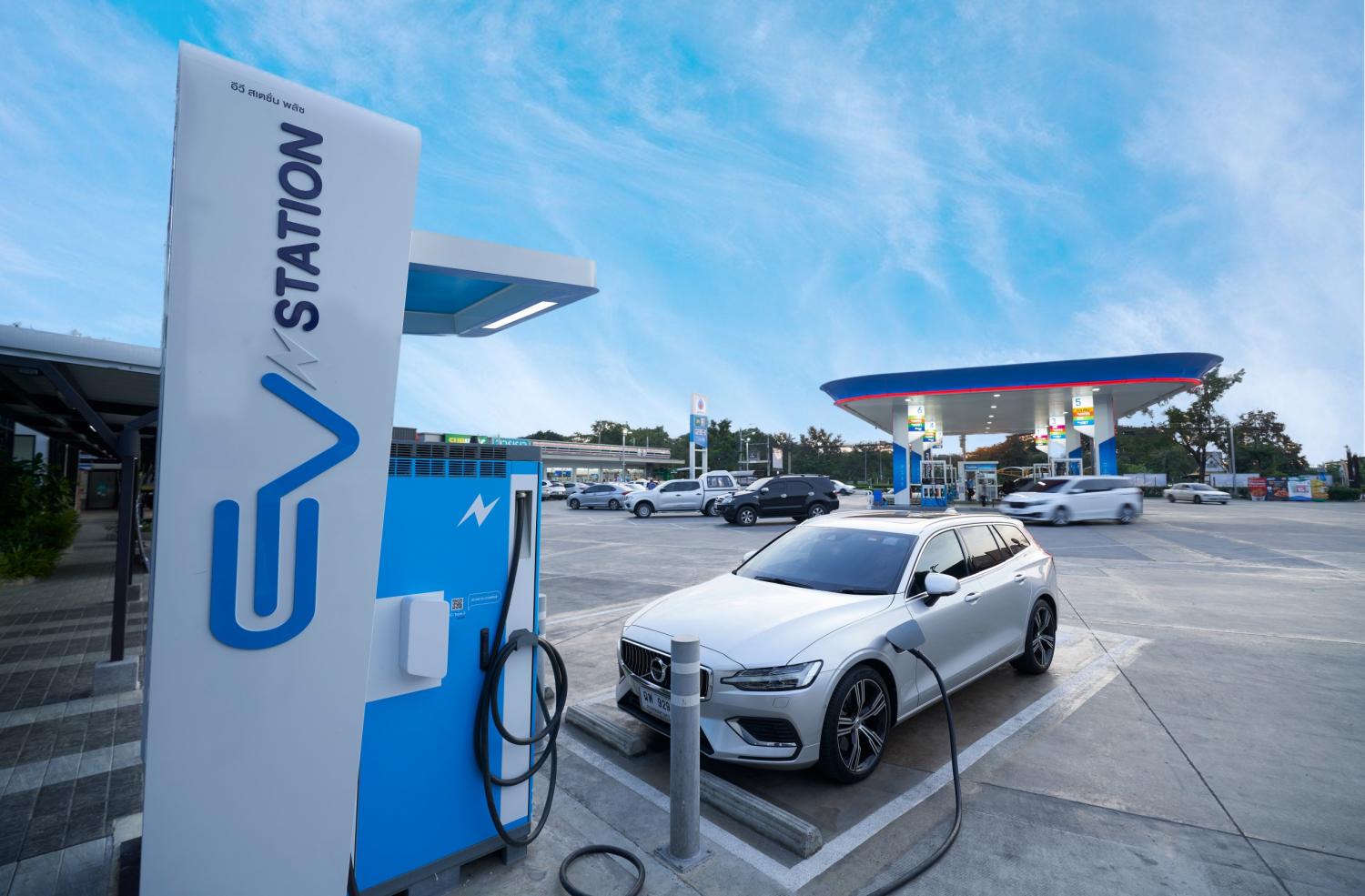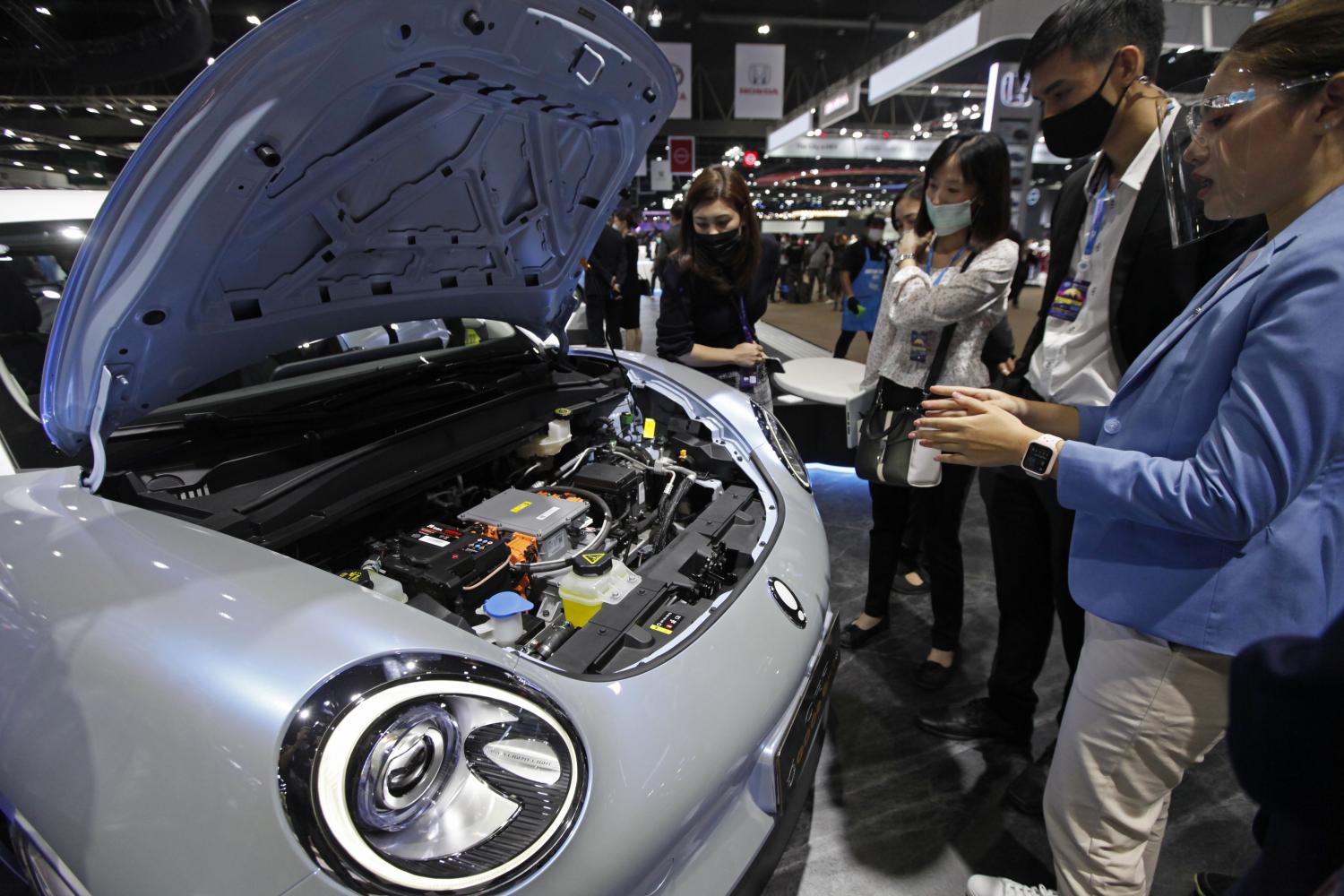
The entry of more Chinese electric vehicle (EV) producers into the Thai market is not only improving sentiment among buyers as they can choose from a wider variety of models, but it is also testing their brand loyalty.
Thais have long been enamoured with cars produced by Japanese and European companies, eager to buy their products and services.
With the shift from internal combustion engines to battery-powered vehicles, the question is whether consumers will buy new technology from familiar brands, or take the plunge with Chinese entrants.
Chinese automakers such as GWM, MG, BYD and DFSK introduced their EVs in Thailand at lower prices than foreign competitors. They are also eager to assemble cars and batteries here for domestic and overseas sales.
Some Chinese firms even vowed to help the government turn Thailand into an EV hub for Asean.
"Chinese carmakers like Great Wall Motor [GWM], MG and BYD have already announced plans to invest in Thailand and join the government in making Thailand a regional centre for EV sales and exports," said Surapong Paisitpatanapong, vice-chairman and spokesman for the Federation of Thai Industries' Automotive Industry Club.
China is expected to become a key player in the Thai EV industry after many Chinese firms stepped up efforts to build their brand awareness and introduce Thai buyers to Chinese electric mobility technology.

BRAND RESET
Branding has been essential in influencing vehicle purchasing decisions for decades, but Chinese producers may be making inroads in the growing EV market by crafting an image in the minds of buyers, say industry analysts.
Chinese car brands are less known than their rivals for traditional car models, but if they meet the needs of EV buyers there is plenty of room for these Chinese brands to grow, said Mr Surapong.
Chinese EVs are intensifying competition across the automotive industry, he said, causing concern among rivals over securing market share in the segment.
"Buyers may still be loyal to brands for oil-powered cars, but in the EV segment, they can easily jump over old brand walls and are willing to try new options," said Pitaya Tanadamrongsak, managing director of EV Primus, the distributor of China's second-largest automaker DFSK (Dongfeng).
Thais were introduced to GWM's ORA Good Cat in late 2021, and within months this battery EV became popular, he said.
Other Chinese brands also caught the eye of EV buyers.
During the 12-day Bangkok International Motor Show in March and April last year, EV bookings increased by 10% to 2,040 units.
At the Thailand International Motor Expo, held at the end of last year, bookings for EVs tallied 5,800 cars, making up 15% of the total 36,679 car bookings, according to the organiser.
European and Japanese brands also offer premium EV technology, but their prices are usually loftier than Chinese brands.
"We don't know whether automakers, especially from Europe, are willing to reduce their prices as this could mean they lose their brand positions," said Mr Pitaya.
The arrival of Chinese EVs may cause other car companies to consider how to protect their market share in Thailand, said Mr Surapong.
Bjoern Joachim Gustrau, vice-president of sales and marketing at Mercedes-Benz Thailand, said his company is not worried about Chinese rivals because it focuses on EVs in the premium segment.
Chinese EVs have a range of prices to satisfy different groups of customers, from buyers with small budgets to those ready to own a car worth more than a million baht.
Mr Pitaya believes Chinese technology can compete with offerings from well-known brands.
"Competition in the Chinese EV market is very tough. If a car company can beat rivals and expand its business into foreign countries, its technology is of a high standard," he said.

COMPETING STRATEGIES
Many Chinese automakers have launched strategies to win over customers, with Neta one of the latest EV brands to enter the Thai market.
Hozon New Energy Automobile, also called Hozon Auto, launched a battery-run city car named "Neta V" in Thailand last August.
Mr Surapong said he believes Neta is not just a newcomer, but can "shake" the market, holding car manufacturers and buyers in awe in terms of its business direction.
In China, Neta is known as Nezha, which is the name of a protection deity in Chinese mythology.
Hozon Auto appears to be adopting the same strategy as Xiaomi, a Chinese manufacturer of smartphones and home electronics, by selling high-quality EVs at inexpensive prices, according to a news report by Ping West, a media and marketing company.
The Zhejiang-based EV maker set up Neta Auto (Thailand) to serve as the centre of its EV business in Asean and announced a cooperation on EV business with national oil and gas conglomerate PTT Plc.
Horizon Plus, a joint venture between PTT's wholly-owned Arun Plus and Taiwan-based Hon Hai Precision Industry Co, a multinational electronics manufacturer, is slated to assemble EVs for Hozon Auto.
Auttapol Rerkpiboon, president and chief executive of PTT, said the company will initially serve other firms in producing EVs rather than spend huge sums to set up a full-fledged facility to construct EVs under a new brand.
PTT's car assembly plant, worth US$1-2 billion, is scheduled to open in 2024, with a capacity of 50,000 units per year. The capacity is projected to rise to 150,000 units per year by 2030.
Other companies are pushing ahead with plans to grow their EV businesses in Thailand.
Chinese automaker BYD announced a 17.8-billion-baht investment to build an EV manufacturing facility in Rayong, with an annual production capacity of 150,000 EVs.
BYD's business partner and sole distributor, Rever Automotive, vowed to compete with rivals by offering on-time car delivery and efficient after-sales services.
Pongsak Lertruedeewattanavong, vice-president of MG Sales, said the company invested more than 2.5 billion baht to build an EV battery manufacturing plant and is conducting a study on how to manage used batteries.
GWM is developing its EV business after announcing it would spend 22.6 billion baht to turn Thailand into its regional base for the EV industry.
GWM also wants Thailand to become a hub for EV R&D in Asean.
The company expects production of its first EV from its Thai assembly plant to be completed in 2024, said Narong Sritalayon, managing director of Great Wall Motor (Thailand).
EV Primus plans to set up an "EV supermarket" for motorists with a variety of lifestyles by offering several car brands with prices ranging from 300,000 baht to 3 million.
The company expects to sell at least five different car brands over the next four years.
EV Primus also announced a co-investment to build a plant in Chachoengsao to assemble EVs, notably brands under Dongfeng, with a budget of more than 400 million baht. The annual production capacity is projected to be 4,000 units.

FEWER WORRIES
For buyers, expensive prices and limited EV charging facilities do not seem to be their biggest concerns.
Buyers keen on EVs do not pay much attention to prices, even though some cost more than 1 million baht, said Mr Surapong.
"These buyers are passionate about new smart technologies and are concerned about the environment, so prices are not a big issue," he said.
Good EV brands not only offer cars running on batteries, but they must also know what car functions Thais want.
"Electric cars must be smart," said Mr Pitaya, referring to the general perception of EVs among Thai drivers.
Technologies such as adaptive cruise control, regenerative braking and blind spot detection are what buyers look for when they buy EVs, he said.
As for buyers with limited budgets, the government is trying to make EVs more affordable by offering incentive packages.
Last year, the cabinet approved a package of incentives, including tax cuts and subsidies, to promote EV consumption and production between 2022-2023.
The subsidies range from 70,000 baht to 150,000 baht, depending on the type and model of vehicle, and there are lower excise taxes and import duties on completely knocked-down and completely built-up units.
In terms of EV infrastructure, more charging facilities are being developed, which should help ease the concerns of motorists who drive long distances.
"There are several hundred EV charging stations in Bangkok and neighbouring provinces to serve drivers," said Mr Surapong.
He believes EV owners are not worried about charging stations as their numbers are growing, with new facilities being built at petrol stations, shopping malls, condominiums and housing estates.








